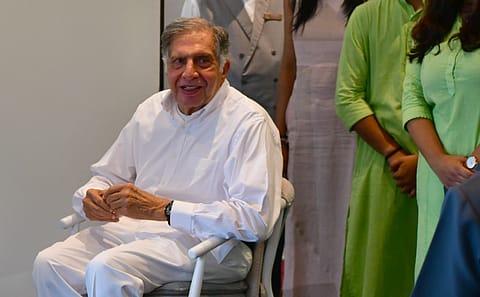Ratan Tata was a guide, mentor and friend: N Chandrasekaran
In an official statement, Tata Sons Chairman N Chandrasekaran expressed his condolences, saying, "We extend our deepest sympathies to his loved ones.

Ratan Tata, one of India’s most influential industrialists, passed away on Wednesday at 86. In an official statement, Tata Sons Chairman N Chandrasekaran expressed his condolences, saying, "We extend our deepest sympathies to his loved ones. His legacy will continue to inspire the Tata Group." He added, "To me, he was a mentor, guide, and friend."
As the former chairman and emeritus of Tata Sons, Tata was instrumental in transforming the Tata Group from a steel-making enterprise into a global conglomerate, with a presence in industries ranging from automobiles to semiconductors. His visionary leadership and philanthropic contributions have left an indelible mark on both Indian industry and society.
Born on December 28, 1937, to a prominent Tata family, Ratan was the son of Naval and Sooni Tata. After completing his early education in Mumbai, he earned a degree in architecture and structural engineering from Cornell University and later attended the Harvard Business School's advanced management program. He then joined the Tata Group in 1962 as an apprentice at Tata Steel and rapidly advanced through the ranks. In 1991, he succeeded JRD Tata as chairman of Tata Sons, leading the group through a transformative era of diversification and globalisation. Under his leadership, the Tata Group expanded into sectors such as steel, automobiles, information technology, telecommunications, and hospitality, cementing its position as a global conglomerate.
With notable acquisitions like Jaguar Land Rover in 2008 and Corus Steel in 2007, Ratan strengthened the group’s position in the global automotive and steel sectors. Tata prioritised ethical business practices and corporate social responsibility, setting a standard for responsible corporate governance in India.
In 2008, Ratan Tata achieved a landmark accomplishment with the launch of the Tata Nano, the world’s most affordable car. Designed to provide safe and economical transportation for India’s growing middle class, the Nano reflected Tata’s commitment to automotive innovation and his vision of making mobility accessible to all, despite the project's challenges.
In addition to his business achievements, Ratan Tata was a dedicated philanthropist. He made significant contributions to the Tata Trusts, which have supported numerous social initiatives across India, focusing on areas such as education, healthcare, rural development, and arts and culture. Through these efforts, the Trusts have positively impacted millions of lives. Tata’s philanthropic work earned him prestigious honours, including the Padma Bhushan and the Padma Vibhushan, India’s third and second-highest civilian awards.
After retiring as chairman of Tata Sons in 2012, Tata remained active in various philanthropic and business ventures. He continued to mentor young entrepreneurs, advocate for social causes, and support educational institutions and start-ups, driven by his passion for education and innovation. Even in retirement, Tata played a key role in shaping India’s industrial landscape and nurturing a new generation of leaders.